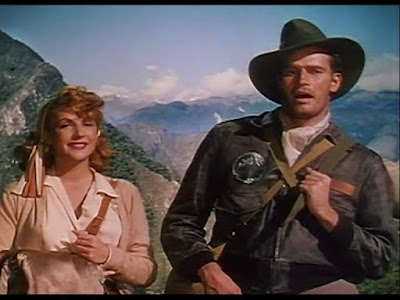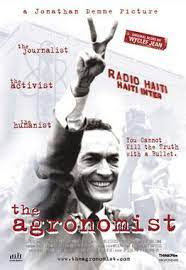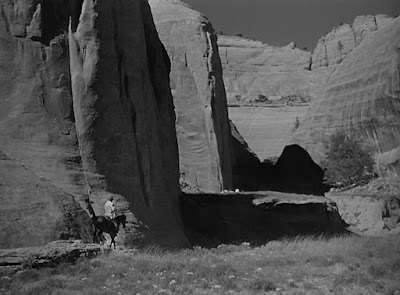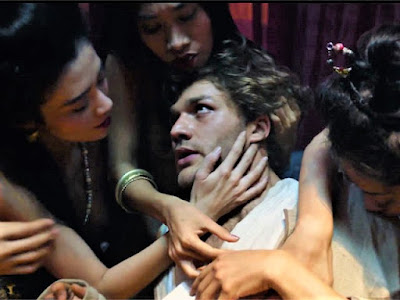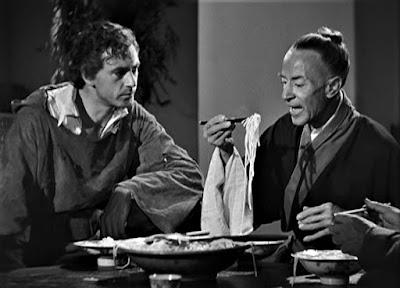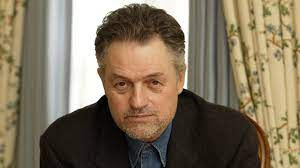 |
| Jonathan Demme |
Editor's Note: This is a second in a series of transcripts of interviews recorded by Melbourne film critic Tom Ryan during the years when he reviewed films for The Sunday Age. The first in the series was with the French film-maker Costa-Gavras and it can be found If You Click Here. This is part one of Tom's discussion with Jonathan Demme. Part two will be published shortly*********
As will become clear in the following interview, Jonathan Demme (1944 – 2017) never really saw himself as a Hollywood director. When I spoke to him he was in a bouncy mood, delighted by Manhattan’s early spring blossoms and excited to be moving into new offices, much smaller than his previous ones. He was also still buzzing about the Bob Dylan concert he’d attended the previous evening at Broadway’s Beacon Theatre, and taking some time off from his busy work schedule.
He’s probably best known internationally as the director of The Silence of the Lambs, which was nominated for seven Oscars in 1992 and won five, including one for him. He also hit the jackpot a couple of years later with Philadelphia, a drama with a message starring Tom Hanks as a lawyer suffering from AIDS; and again with The Manchurian Candidate, a politically subversive remake of John Frankenheimer’s 1962 thriller. In it, Demme and his screenwriters switch the villains from the Red Menace to the Corporate Menace, with Manchurian Global as a thinly-disguised version of Halliburton.
He’d had some difficult times in the business, most famously when Swing Shift (1984) was taken out of his hands by lead actress Goldie Hawn, whose contract allowed her “approval rights”. It was partially reshot and re-edited according to her demands and his initial inclination was to go for the Alan Smithee option, although he was eventually talked out of that.
But he remained justifiably proud of most of his work in Hollywood following his beginnings with maverick producer Roger Corman in the mid-’70s. It includes the wonderful Melvin and Howard (1980), Something Wild (1986), Married to the Mob (1988) and Beloved (1998).
He was equally proud of the films he made about musicians (including David Byrne and Talking Heads, Neil Young and Crazy Horse, Robyn Hitchcock, and Justin Timberlake and the Tennessee Kids) and of the many politically committed documentaries which he directed and/or produced over the years. His work in Haiti rightly earned him accolades for his celebrations of the local culture and his commitment to the people’s cause there.
He backed at least half a dozen documentaries shot by others in the still strife-ridden Caribbean nation, including two by Patricia Benoit, Tonbe/Leve (1992) and Courage and Pain (1996). And he directed two himself. The first was Haiti: Dreams of Democracy (1987), made around a year after the overthrow of dictator Jean-Claude “Baby Doc” Duvalier, and a few years before the 1991 landslide election of President Jean-Bertrand Aristide, a radical Catholic priest. The second, The Agronomist (2003), completed before Demme began work on The Manchurian Candidate, deals with the life and death of outspoken Radio Haiti journalist Jean Dominique, who was murdered by two gunmen in April, 2000.
It was screened as part of a documentary season programmed by the Australian Centre for the Moving Image in Melbourne in June, 2005. I spoke with Demme by phone about it and his career a couple of months earlier. My contributions are in italics.
***
The Agronomist is the second film you’ve directed about Haiti, but you’ve also produced a number of others (including Haiti: Killing the Dream, directed by Katharine Kean and Rudy Stern). What first drew you to Haiti?
Haitian art. I don’t know if any Haitian art manages to get down to Australia or not.
As far as I know, not really.
Historically Haitian art is very rich and very varied. I’ve seen Aboriginal art, which I think is great, but it’s quite different from Haitian art. What they have in common is no restrictions, no academic restrictions, on the imagery and a lot of spiritually driven material. In New York City, one gets exposed a little bit to Haitian art. I really got interested in it and finally I got so interested I thought, ‘Well, I’ve got to go to the country that spawns this.’ And I went down there.
When was this?
That was in 1986. In my life I’ve lived in four different countries – this is a thought I had earlier this week when I was trying to explain something to my daughter – and I feel like I’ve lived in Haiti, although I haven’t. So I guess Haiti lives in me.
And that first trip I made down there, I went to see the art but I was taken by the people. It was exactly a year after “Baby Doc” had been overthrown, which was exactly a year prior to the first democratic elections in the history of the country. And all you could see everywhere there was this amazing enthusiasm for the process and for removing the shackles of the dictatorship for once and for all. It was very intoxicating.
It really turned me on and made me want to go back and do a documentary that would somehow capture this passion for democracy and this passion to create a better tomorrow for the next generation through social and political change. That turned out to be Haiti: Dreams of Democracy.
 |
| Haiti: Dreams of Democracy |
And what happened for me really was that the more I learned about Haiti – and through making the documentary I made an enormous number of friends down there – the more I became interested in the gigantic collection of Haitian art and Haitian music.
At the same time, the more I learned about Haiti the more I came to understand how profoundly toxic a presence US foreign policy was in Haiti. And I learnt that a dozen all-powerful families in Haiti retain lobbyists in Washington working very closely with Republican congressmen to make sure that the foreign policy suits the rich people in Haiti’s agenda, and realised that the United States was really part of what was keeping the Haitian people down. So when President Aristide was elected and overthrown, my next phase really was to feel galvanised as an American citizen. I knew that the CIA had participated in the coup.
So I became sort of an activist, as a former hippie – or maybe you’re never a former hippie. But as a hippie from the ’60s I got all radicalised again around Haiti this time and wanting to protest the government.
So you’re an activist with a camera…
Yes. Yes, I came to think, actually, Tom, that at certain points, organising protest groups which I did and participating and getting arrested and writing letters and all that was fine. But I have come to feel that maybe the best thing you can do if you have social concerns is to try to make a film to give you an outlet to illustrate what it is that concerns you about a subject and hope that the film will maybe communicate and provide an opportunity for others to become concerned about the same thing.
One of the things that’s fascinating to me is the way that politics is critical to your musical documentaries and music to the political ones (like The Agronomist). Is this the way you think about them?
I like that perspective. I also think that music – whether it’s a documentary or whether it’s a feature film – is the great directorial crutch. Music is your last chance. You’ve filmed it, you’ve edited it, you’ve put the sound effects in. Now it’s your laaast chance to pull the audience in that much more via the magic of music. So I shamelessly get swept away by the musical dimension of anything I do.
Dreams of Democracy goes so far as to suggest that “songs are all about struggle”. Is that your experience of the music in Haiti?
I think one of the things that really provided a secret framework for Haiti:Dreams of Democracy was, yes, I wanted to capture the spirit of democracy in the air. And, interestingly, here’s a country where the vast majority of the population – the figure at the time was 85% of the population – is illiterate. So how do you educate people about democracy? How do you raise the collective consciousness in regards to participating in a democracy when the vast majority of people can’t read? Well, the answer is: through song, through street theatre, through street art.
In Haiti:Dreams of Democracy, there’s a singer named Manno Charlemagne, and everywhere you went he was either called the Bob Marley of Haiti or the Bob Dylan of Haiti. Because all of his songs were about social change, and the content of those songs gave political context to the native democratic aspirations of the individuals who hadn’t read about democracy. That’s also how radio played such an enormous part, and especially Jean Dominique’s Radio Haiti because that station was dedicated to providing a voice and information for an illiterate population.
How did the Duvalier regimes respond to the music? In The Agronomist, Jean Dominique talks about the way in which Creole as a language can be subversive and that this was recognised by the regimes who then repressed that language.
Yeah.
 |
| Jean Dominique, The Agronomist |
Was there any kind of response to the music like that?
Absolutely. And, in fact, one of the exciting things about filming Haiti: Dreams of Democracy was that Manno Charlemagne was wanted for subversion in Haiti at the time of our filming. And yet he was having concerts that would spring up spontaneously. There would be thousands of people attending and, as the military or the police would arrive, alerted that there was a demonstration going on, Manno would vanish. He was so beloved by the people, he just melted away. They got him out of there.
And when I was trying to track him down, everywhere we went we were trying to leave messages that we wanted to film him… And one morning, very early, I got a phone call at our hotel and it was Manno Charlemagne at the other end and he said, “I understand you’re looking for me. I understand that you’re making a film and that you want me to be in it.”
What he offered us was: if we would give him a ride across the mountains to a town called Jacmel [on the Caribbean coast] where he wanted to do a spontaneous concert, he would let us film that concert and would also stop at some remote area and perform some of the songs in the countryside of Haiti for us. And the reason he was offering us this was that by being with a bunch of white foreigners he was assured of not being arrested in his journey across the mountains. That was very thrilling, and we did it and it’s some of the best stuff in the documentary.
So, yeah, during the crackdown under Duvalier, you simply couldn’t sing about social change and social complaints because anyone who expressed themselves in any way against the government under the Duvaliers was arrested and frequently tortured and frequently “disappeared”.
When did you first come across Jean Dominique and Michele Montas?
Well, the names that people kept mentioning when we went down to do the film and asked who were the leaders of the pro-democracy movement, who were the people who are really leading the charge here and raising the consciousness, were Manno Charlemagne and Radio Haiti. So it was much easier to get a meeting with Radio Haiti. So we called and we got permission to film their editorial about the one-year anniversary of when Duvalier left. And we went in there and when I saw Jean Dominique I was just struck immediately by his extraordinary charisma. I was really, really taken with the guy. And I’d sort of got it in my head that this was someone who I hoped I would cross paths with again some day.
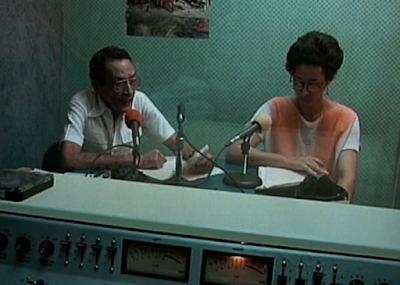 |
Jean Dominique and Michèle Montas in the
Radio Haiti studio, The Agronomist. |
And then when he went into exile in New York, after Aristide was overthrown and Radio Haiti was attacked, I heard about that and that’s when I called him up and asked him if he would consider being the subject of a documentary that would be a portrait of a journalist in exile. I told him it would have a built-in happy ending because, inevitably, one day the coup would be over and then the documentary could end with the journalist back at his microphone. A happy ending!
I thought it was a good idea for a documentary, but I didn’t think it was a brilliant one. It certainly gave me the opportunity to get to know this guy better, to film him, because my ultimate secret agenda, Tom, I swear to you, was that I felt that one day I might have a script that would have a part in it that I could offer to this Haitian radio journalist who would be so dazzling that he would get an Oscar nomination and I could dine out forever on what a great discoverer of unlikely stars I was. He would never have taken a part in a feature film, but he would have been great.
So you actually started work on The Agronomist as early as ’91 without knowing it was going to be The Agronomist?
Yes. And, by the way, we filmed over the course of the coup and then, when Jean returned to Haiti in ’94, we did go back in order to shoot him back at the microphone. But the station had been so devastated and the destruction by the army had been so comprehensive that it was gonna be ages before he actually went back on the air. And, at that point, Jean also had gotten fed up with being filmed and he thought it was kind of a bad idea.
The good news was we had become very good friends. The unfortunate news was he really wanted the filming to end. So we pulled the plug on the documentary, the friendship intact. My mission had been accomplished. I had this fantastic screen-test material on him and it was all shelved and it remained shelved until the day that Jean was assassinated. And at that point it seemed imperative that the film get finished. It was really a way to act out one’s grief and anguish at the loss of this great guy and this great friend.
And you still managed to find a way of giving him the triumphant return at the end…
Yeah. As we accumulated more and more footage of Jean and that footage came in at the end – that was filmed by CBS – I was so moved by that moment. And it was also amazing to see this guy who’d been so strong and so tough and so cynical, it was amazing to see how moved he was. It gave a whole other dimension to his humanity and the footage spoke to me. It said that this is the mood to end on, this is the mood to leave the audience with. That moment of seeing Jean so adored and so moved himself.
You’re doing in your way what Michele Montas [Jean Dominique’s widow] does on the radio, which is to allow the voice to continue.
Well, it’s incredible because we wanted so much to show this film in Haiti. But the unrest and insecurity and violence has been so extreme over the year since we finished it that we just didn’t know when were we going to get to do it. Then finally this year we got two television stations to agree to broadcast the film on April 3rd, the anniversary of Jean’s death.
So, earlier this month, The Agronomist was finally seen, in Creole. We did a special Creole version, in Haiti. And now we’re making hundreds and hundreds of video cassettes and shipping them down there. We’d had a lot of requests off of the TV showing from groups throughout Haiti asking, “How can we get a copy of it? We want to show it.” So we’re sending free cassettes to everyone who asks and we’re sending groups of cassettes to people we know down there in the different cities saying, “Spread them around. Make copies. Let’s keep Jean’s voice alive.”
You know, I have to say, Tom, I love everything that Jean Dominique stood for and the extent to which he was willing to live out his passion for social change. And what I like best about this film and what I like best about keeping Jean’s voice alive is just how charismatic and slightly crazy he was.
Yes.
I mean he’s got the glint of a madman in his eyes, and I think it’s quite incredible to get intimate with him for an hour and a half and realise that, my God, there’s been someone like this on the planet.
Who do you think murdered him and why?
The why is easier. He was murdered in order to silence his voice. No doubt. Because Jean was utterly – and I hope the film shows this – an equal opportunity champion. He had no allegiance to any political party. He had no allegiance to any political figure. He criticised whatever he saw as needing criticism.
The confrontation with Aristide is quite extraordinary.
I know. And you know, I’ve always felt that Jean Dominique, as wily and brilliant as he was, also had this kind of naïve side. I’m convinced, because of his past relationship with Aristide and his past belief in Aristide, that Jean felt that in the interview he was providing Aristide with a golden opportunity to come clean and to really address so many of the issues that had started to concern so many of the people about Aristide, about the new Aristide.
To Jean’s horror he saw Aristide starting to resort to these pathetic platitudes and metaphors and dancing away from these very direct questions, from these very clear opportunities to clean the slate. Jean was an aggressive journalist and when he saw Aristide doing that he really did go for the throat. And, as Michelle says in the documentary, that was the end of that relationship.
 |
Jonathan Demme and Jean Dominique, discussing
Haitian film in 1994 |
To your question about who murdered him: there’s this guy that the film devotes a little attention to, Dany Toussaint, who wanted to be head of the police again, who had been Aristide’s key bodyguard, who had become a senator, and who had attacked Jean’s radio station demanding that he be able to get on the air and say his piece. He refused to cooperate with investigations after Jean’s murder, claiming some kind of parliamentary immunity to avoid sitting down with investigators and answering questions. Now if you’re innocent, you don’t do that, in my view.
So, listen, I live in a country where we cling to the notion that you’re innocent until proven guilty, so I’m incapable of believing that anyone is guilty of something until they’ve confessed or until it’s been proven irrevocably that they did it. But, for me, Dany Toussaint is the big candidate. He’s a big suspect. He’s also gonna run for president in the next election. He got this vaaaasssst “security” operation with virtually a private army of armed investigators. He’s a terrifying figure who gives a lot of money away in a lot of the poorer neighbourhoods.
And I think that with Jean Dominique being so outspoken, especially with elections approaching, and with his power to affect the way his constituency felt, I think that someone in a very, very high position of power – probably a group of people in high positions of power – felt that it was time to shut Dominique up once and for all, and had him killed.
